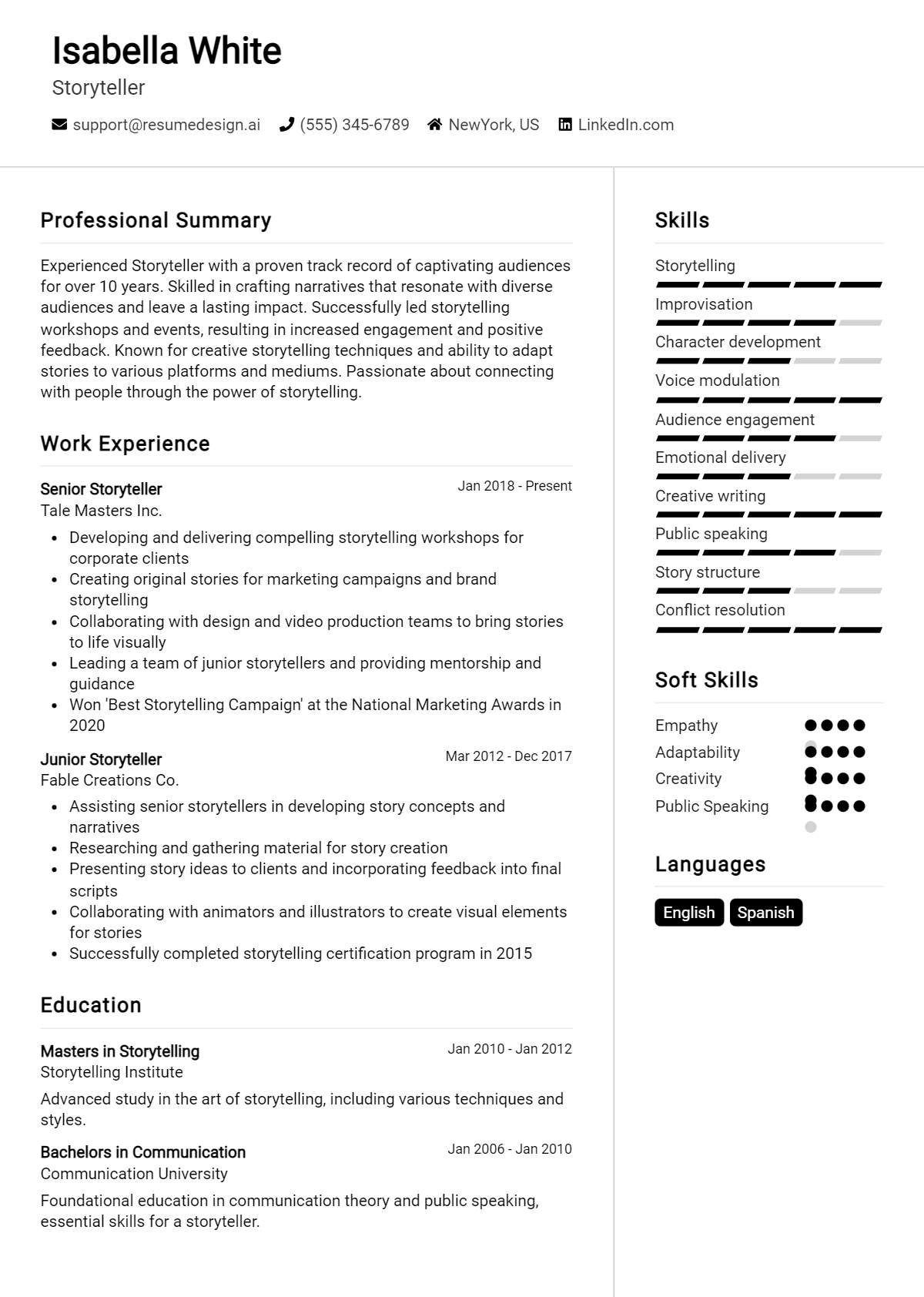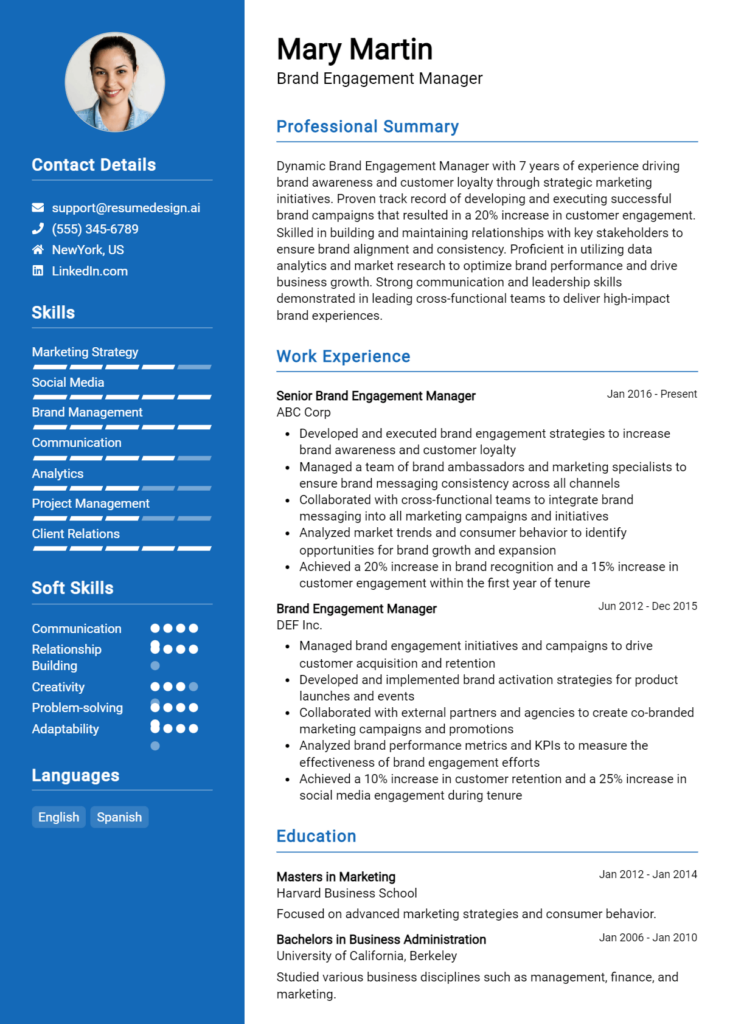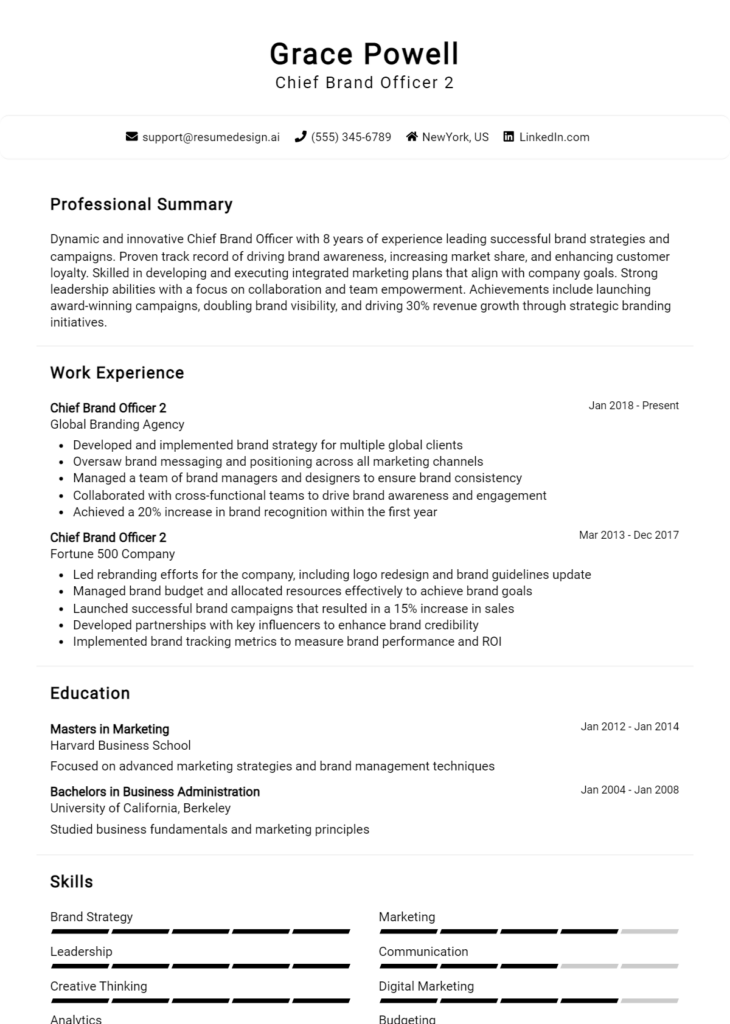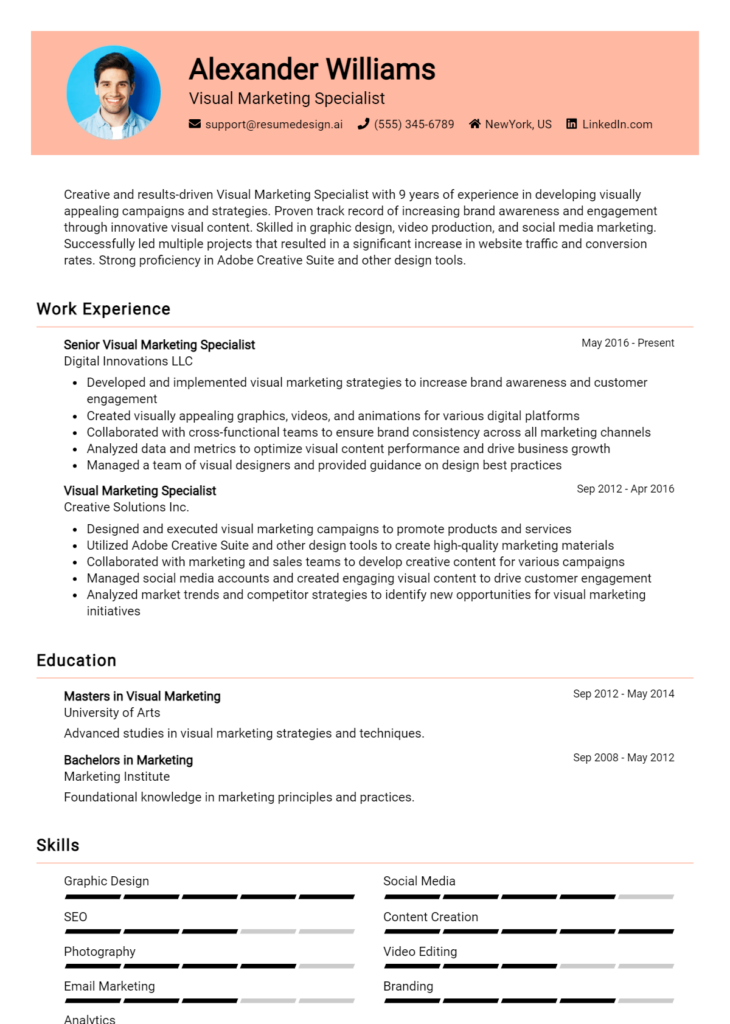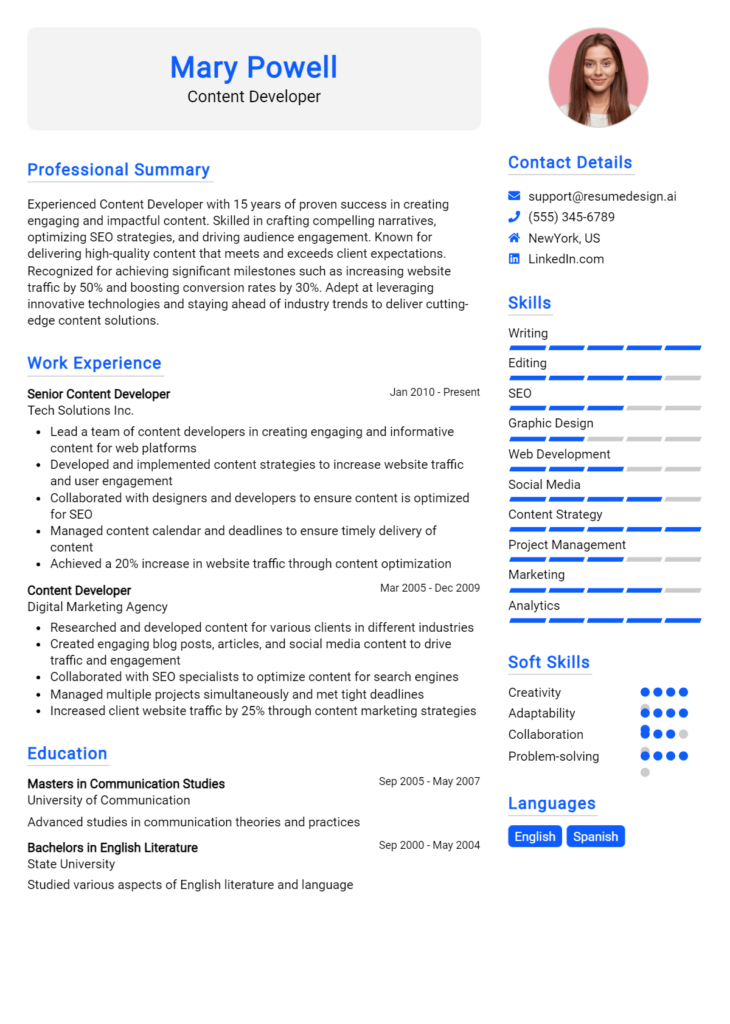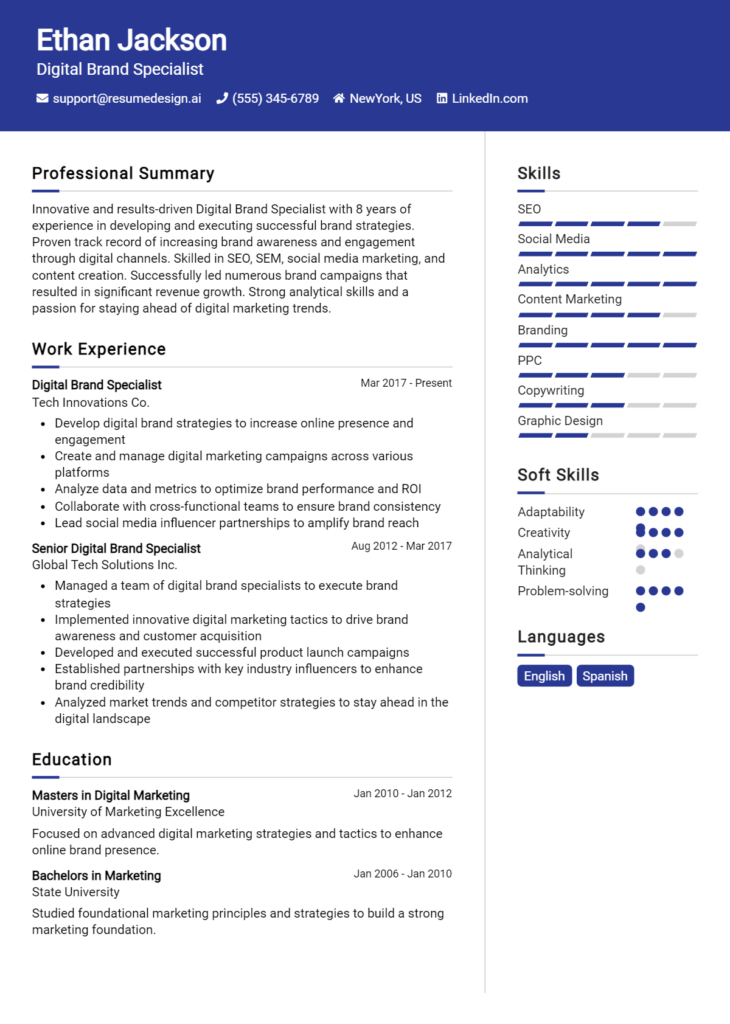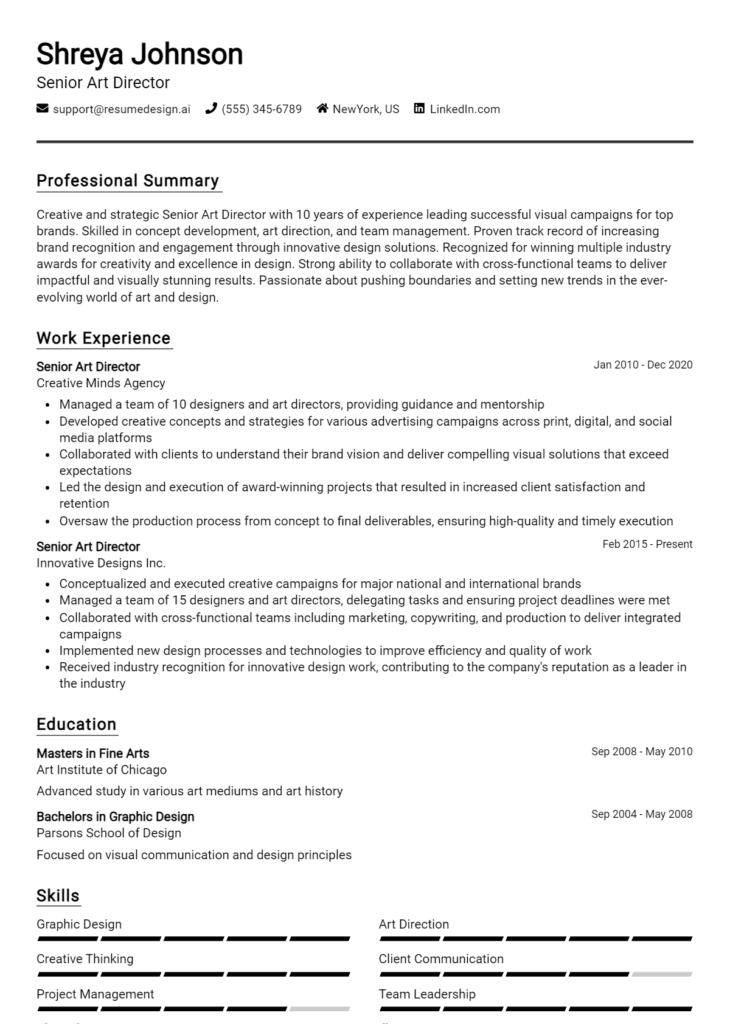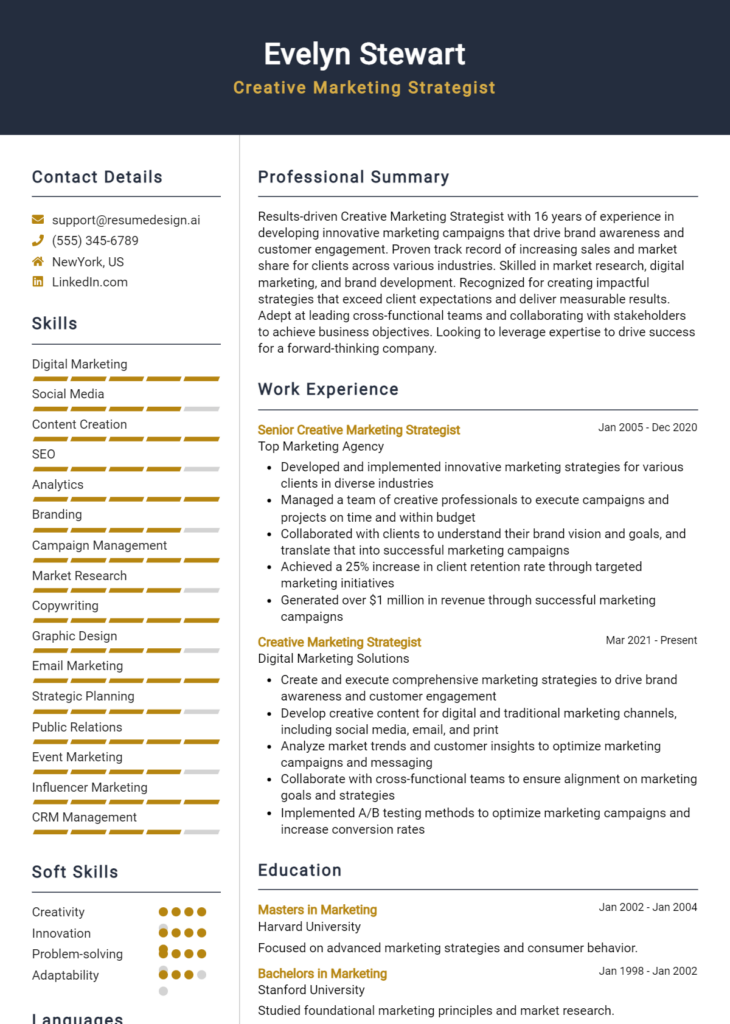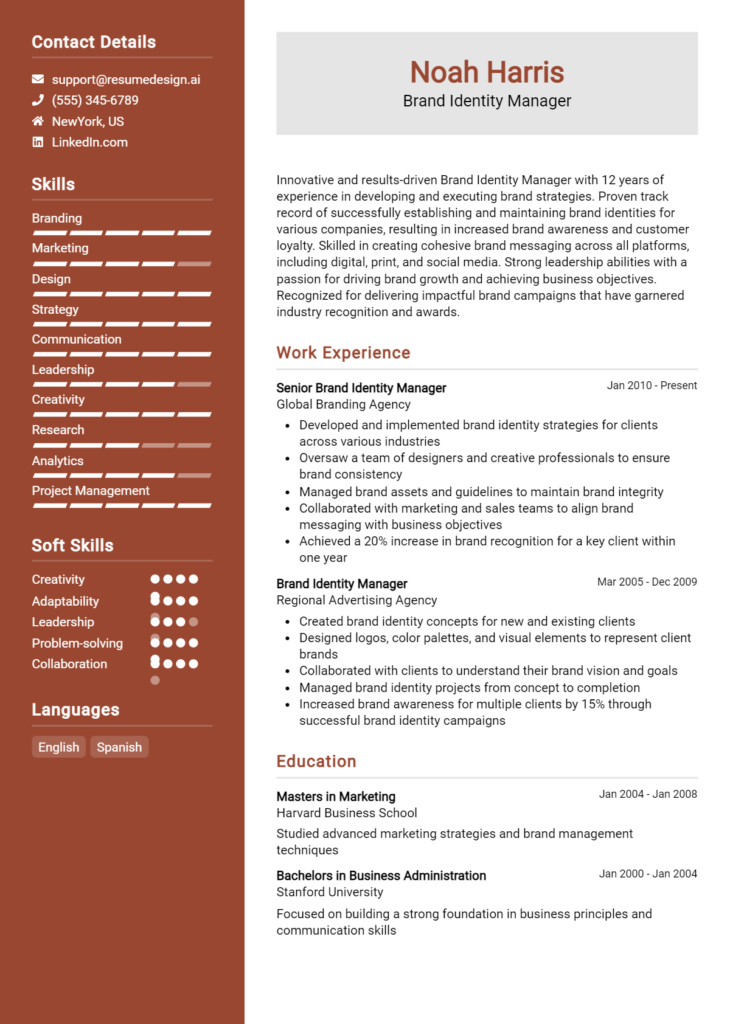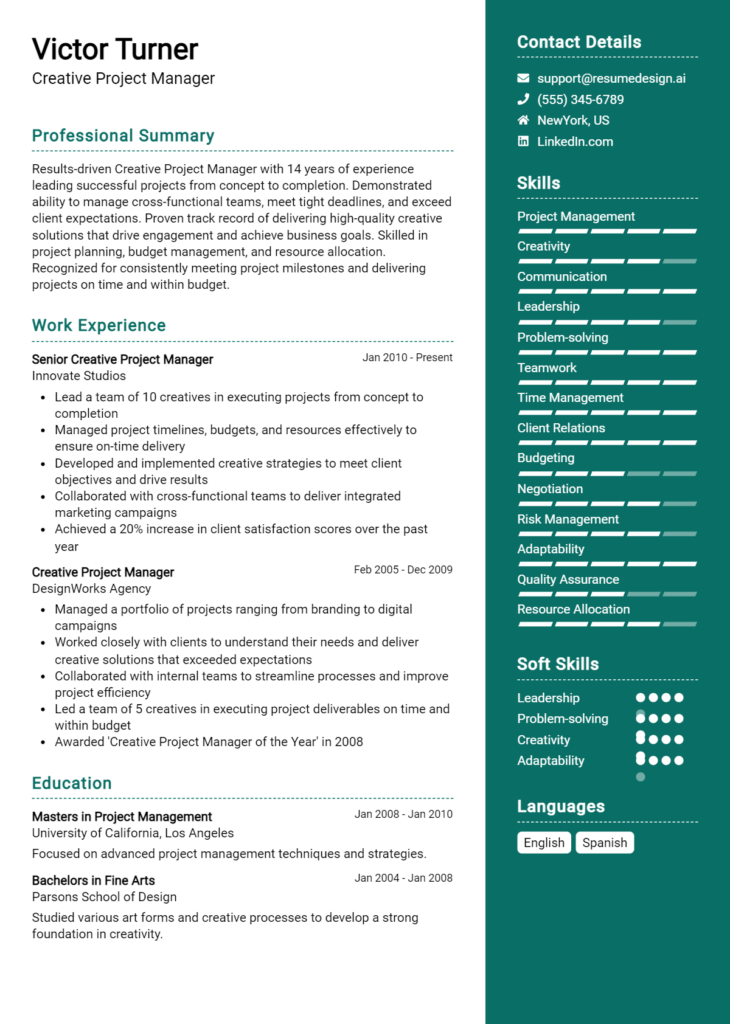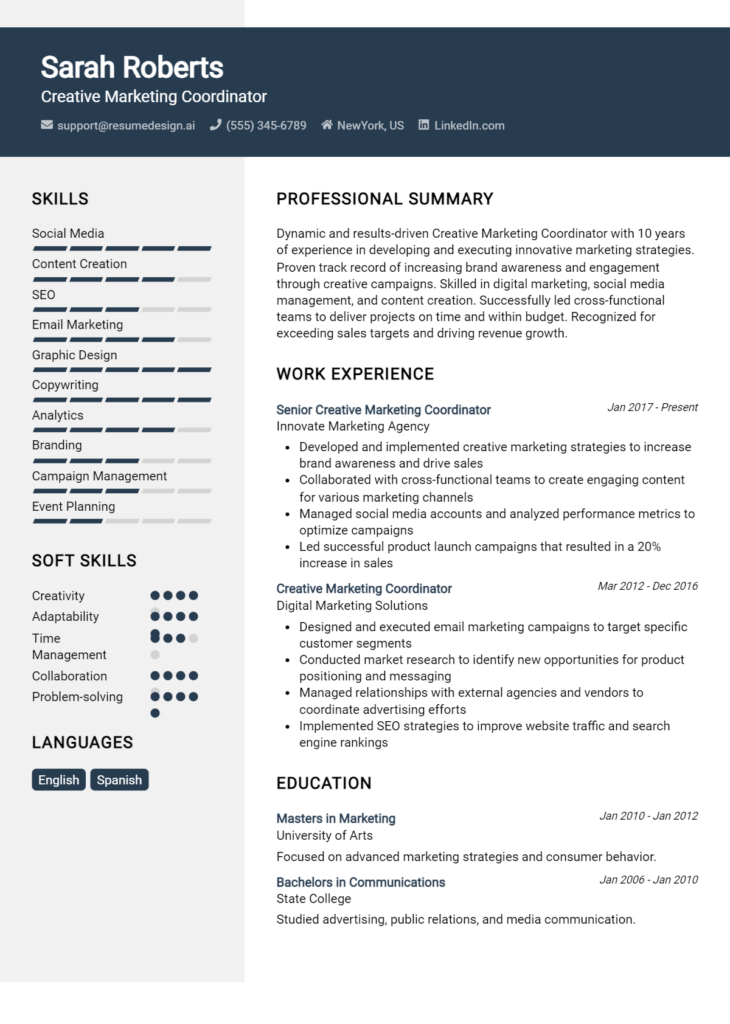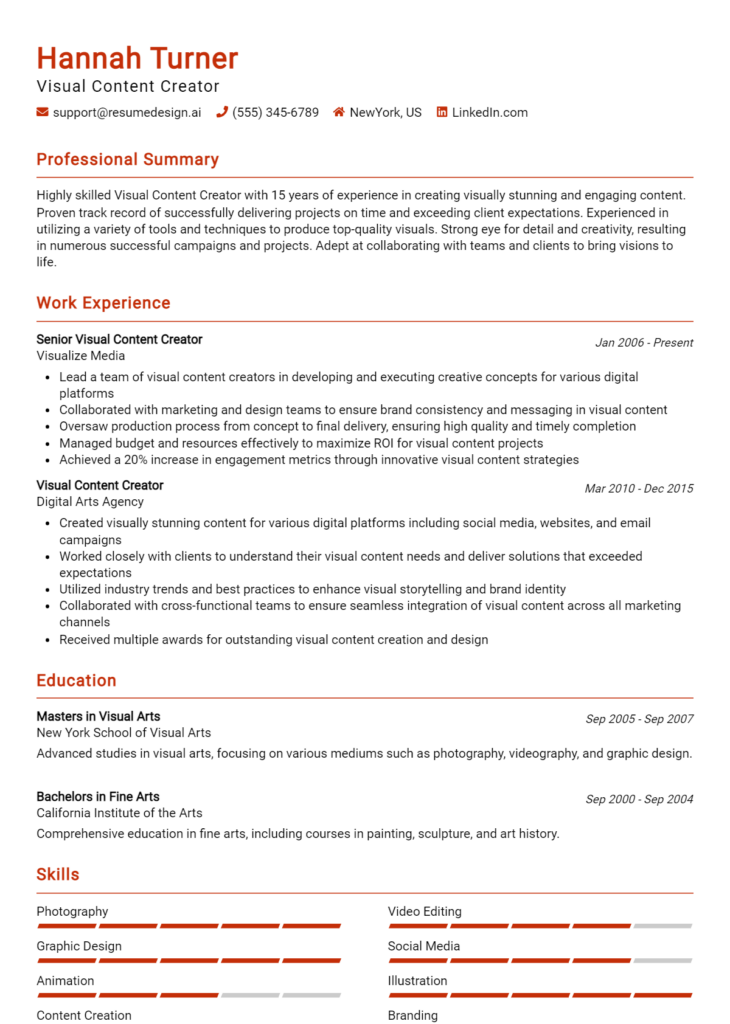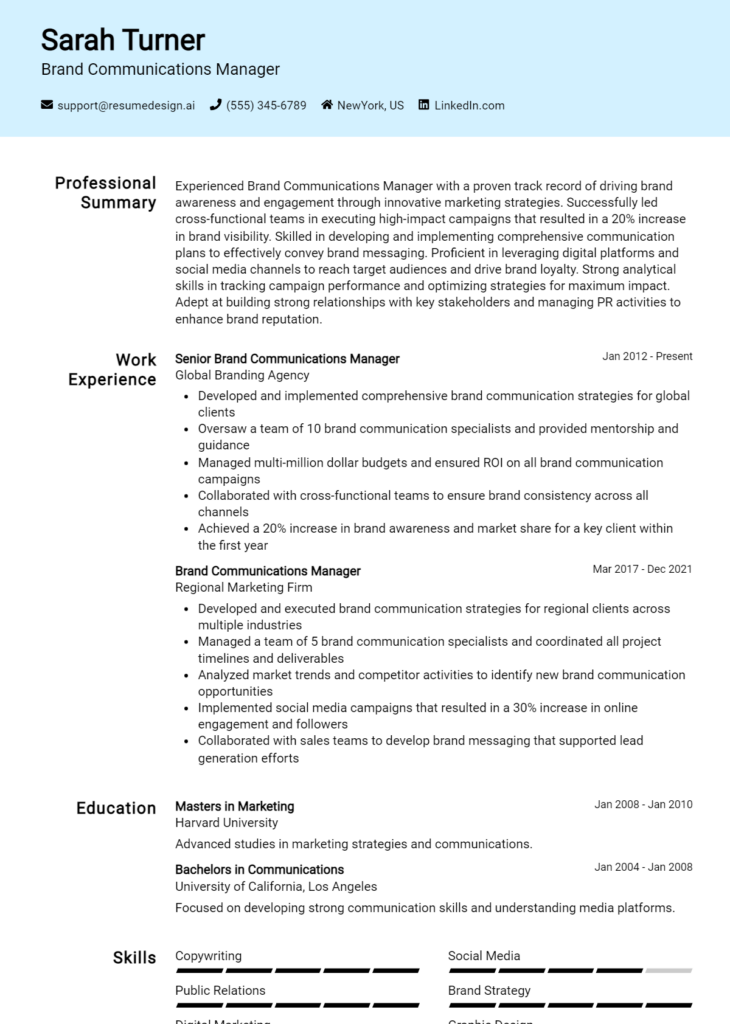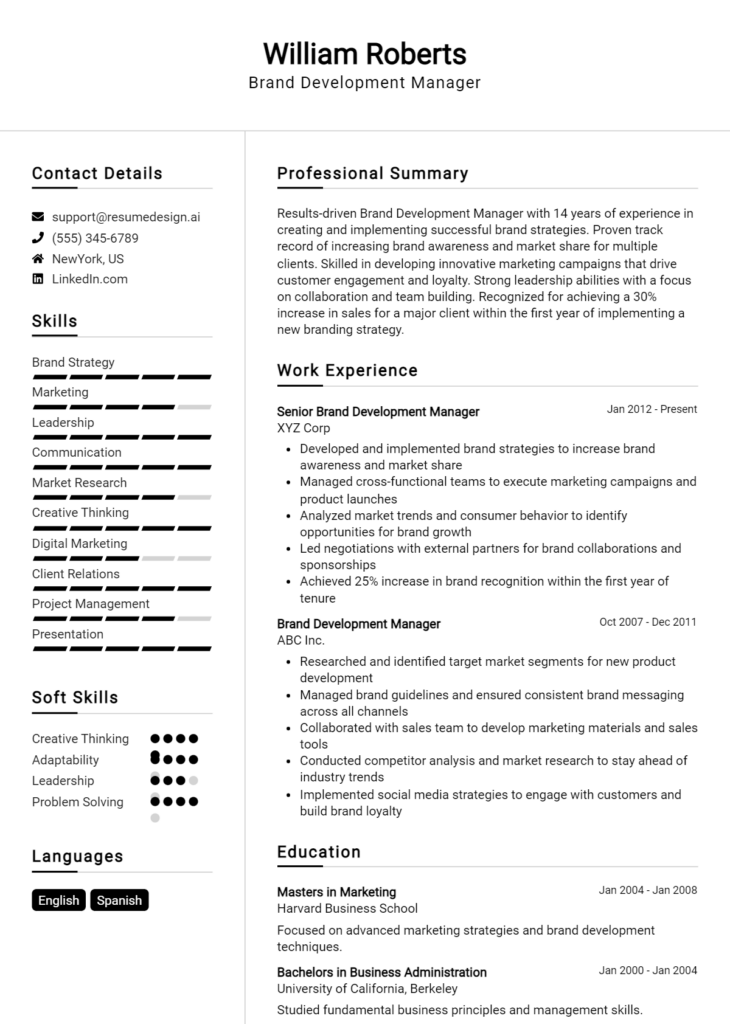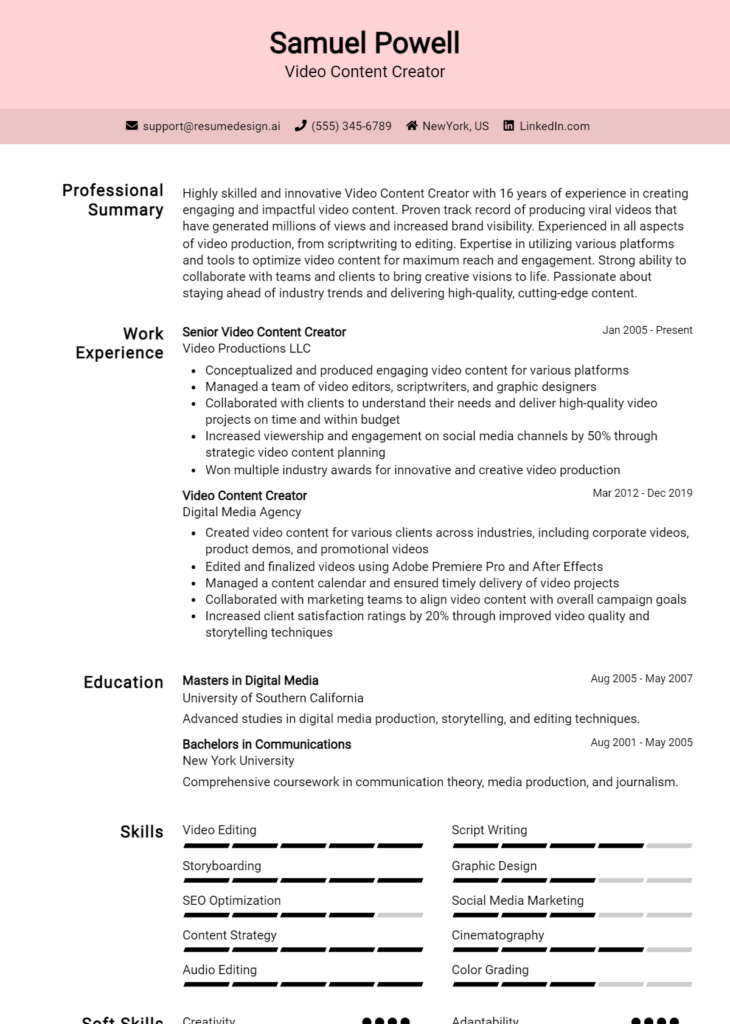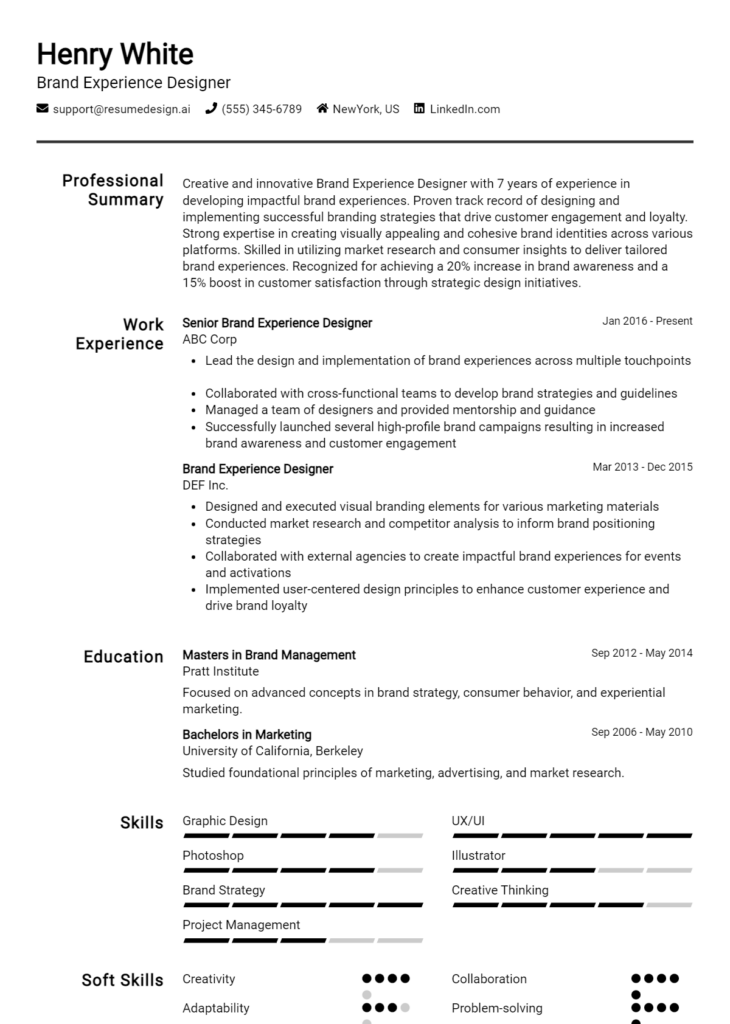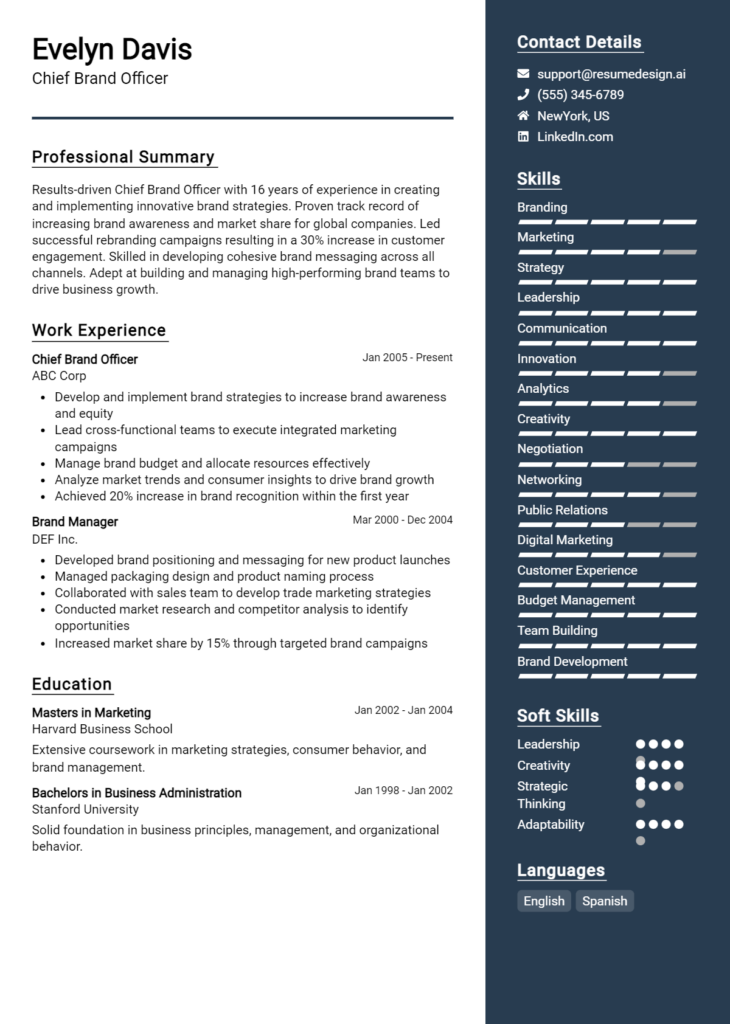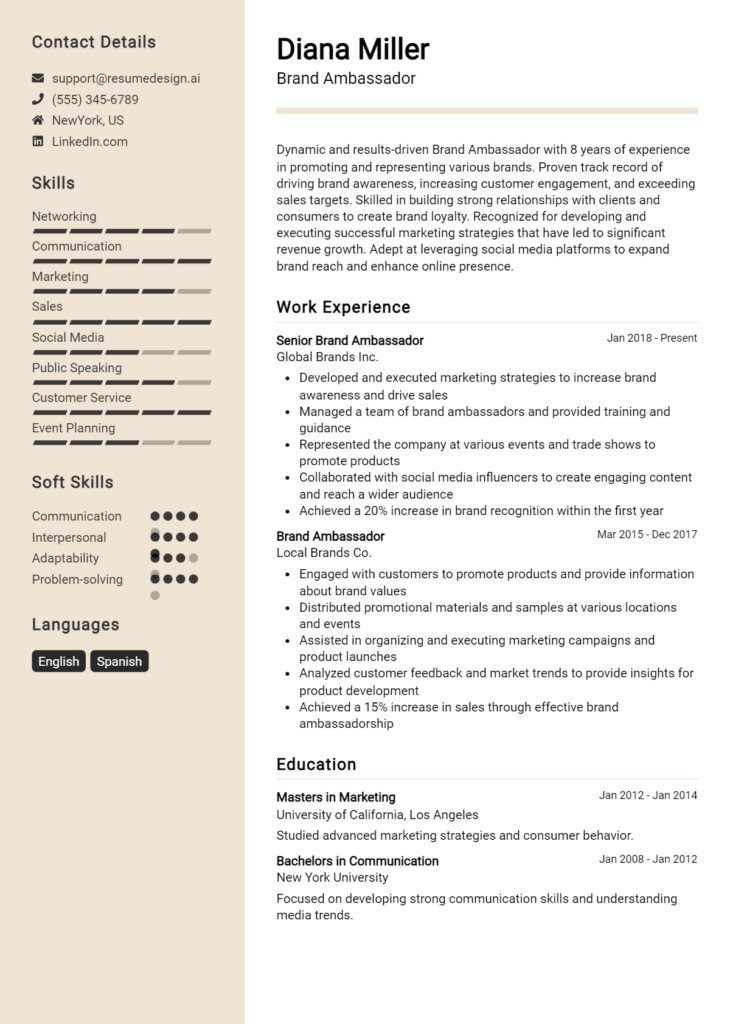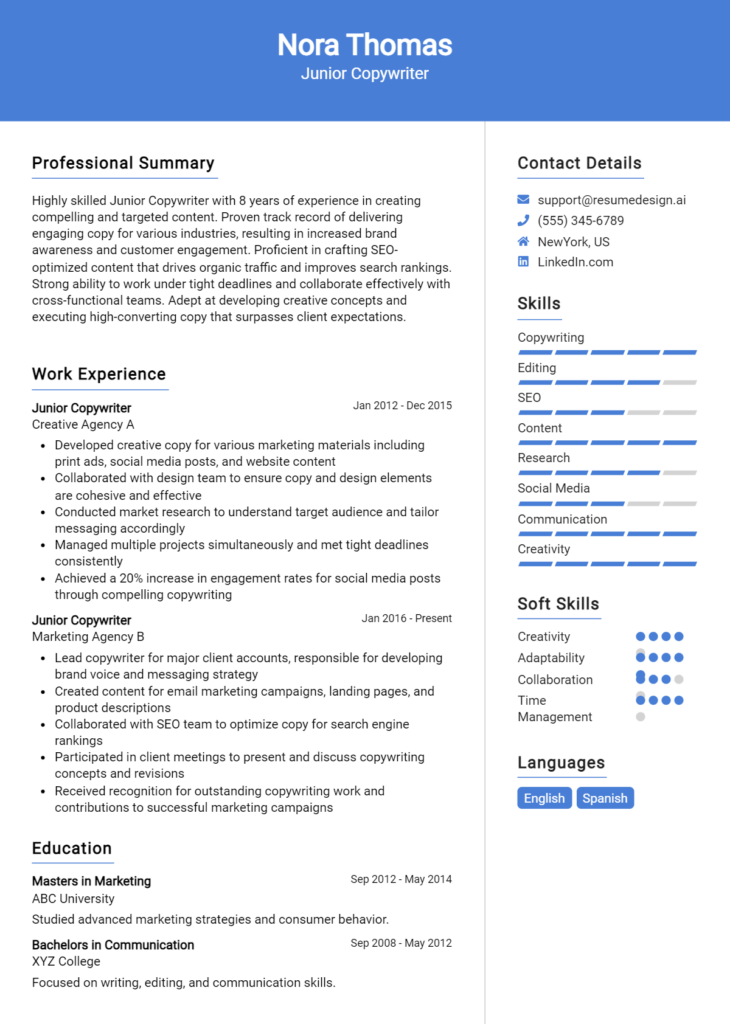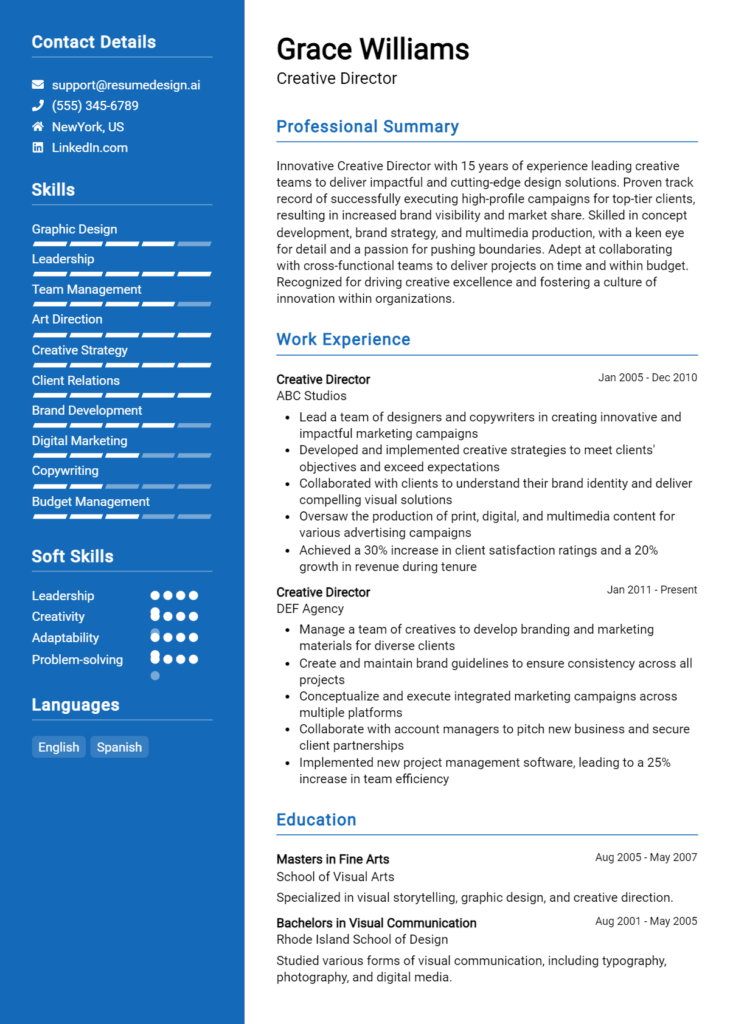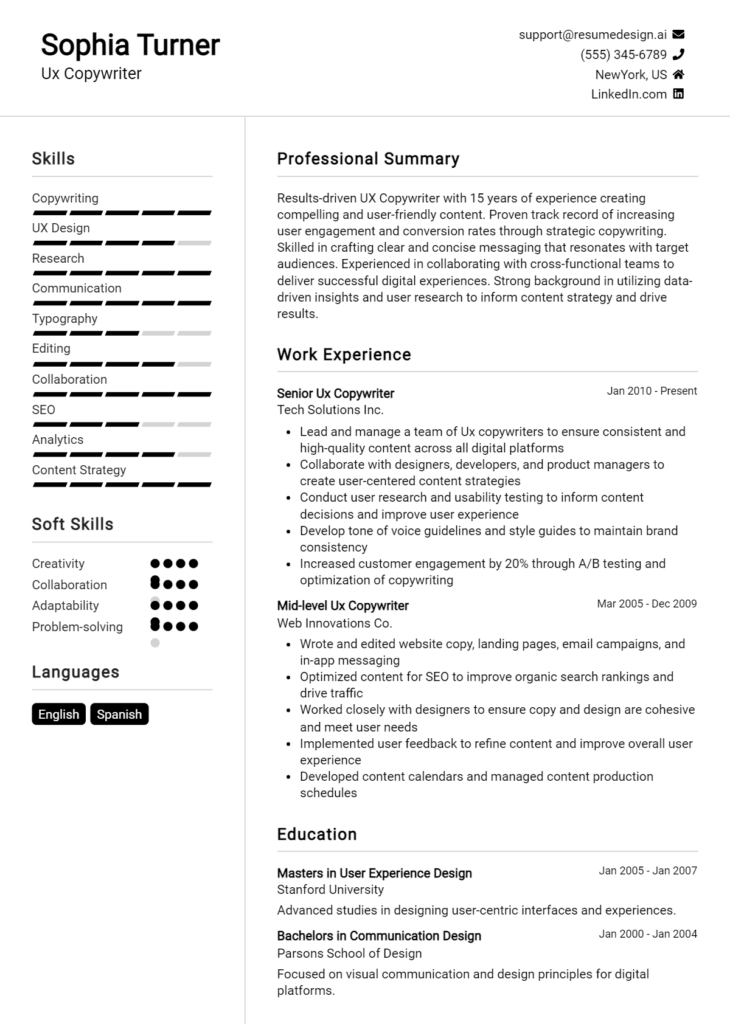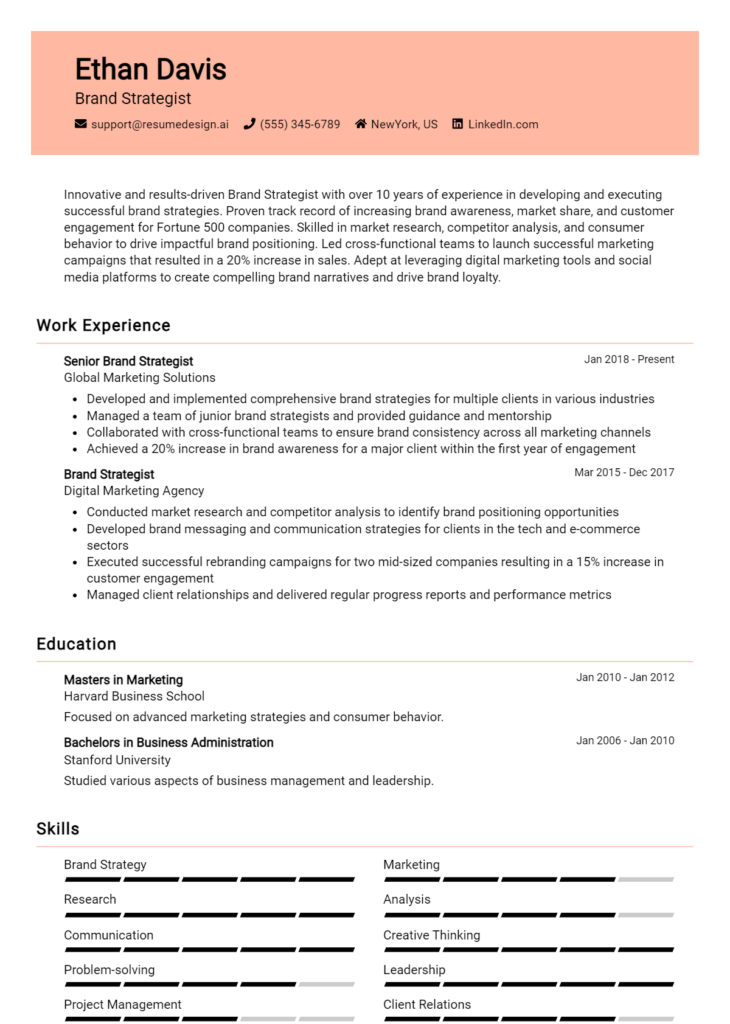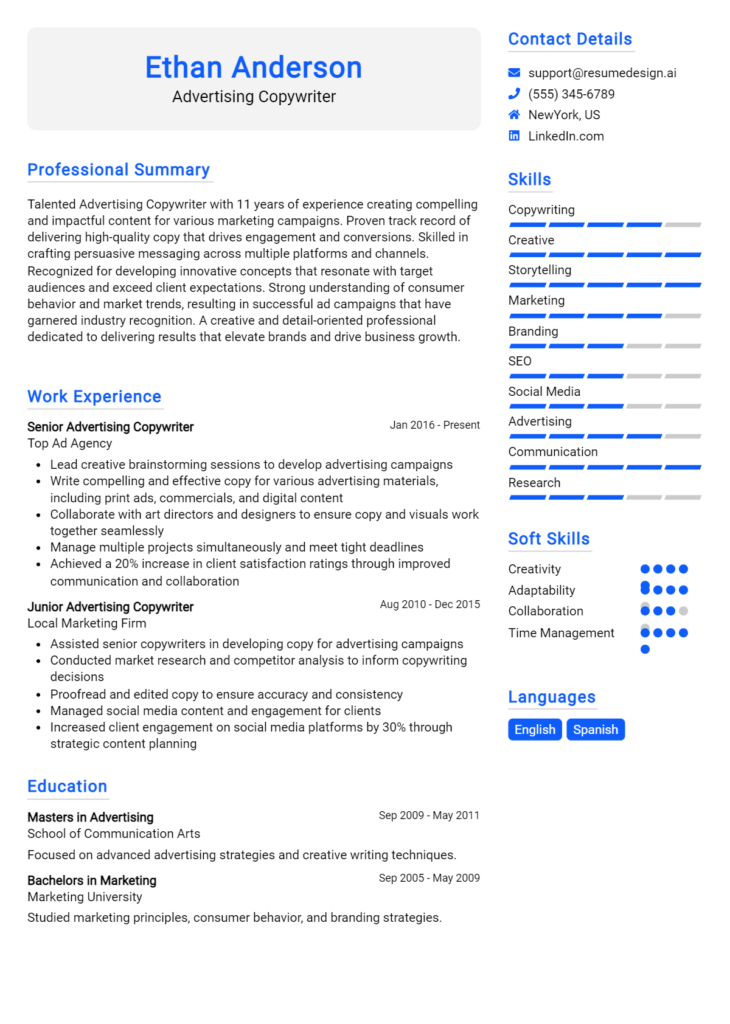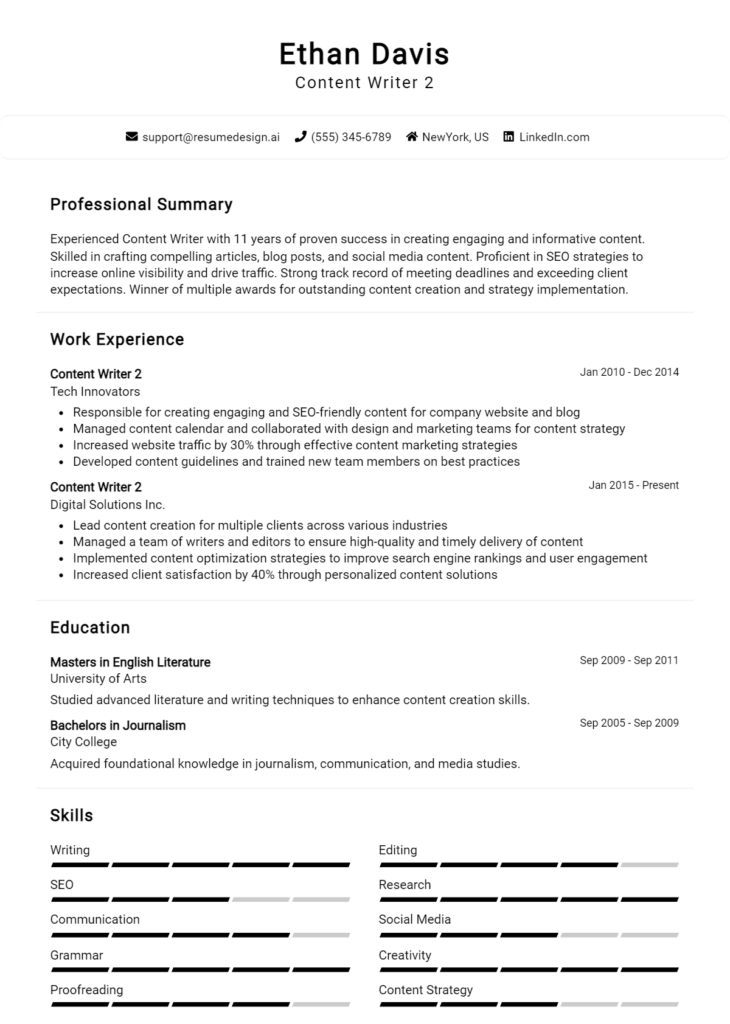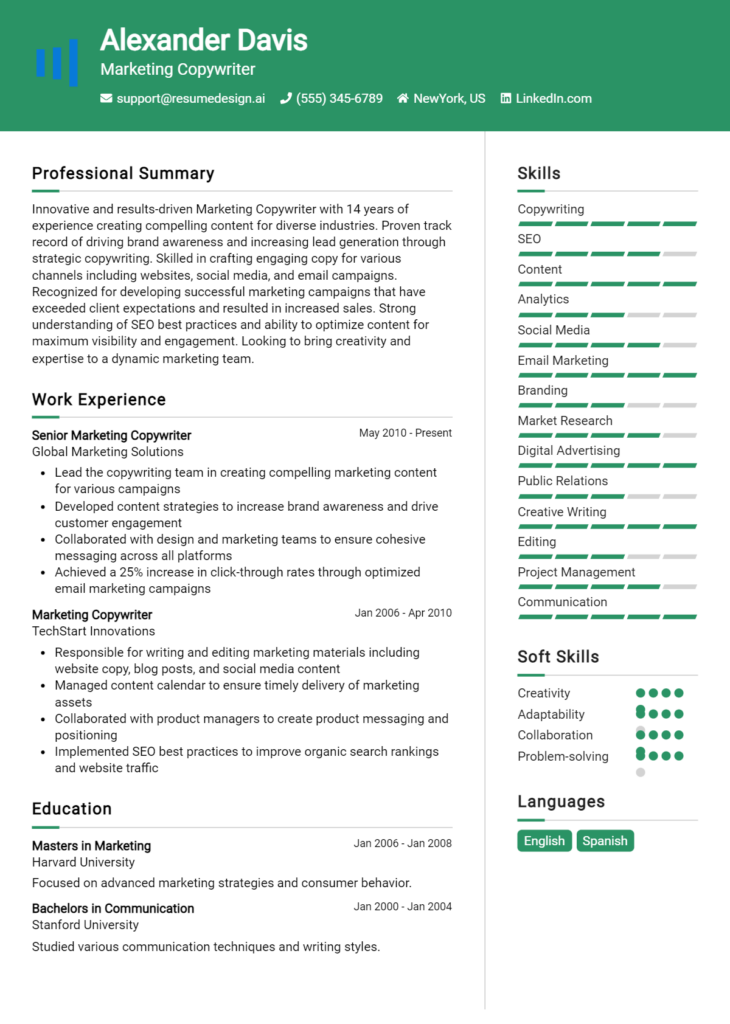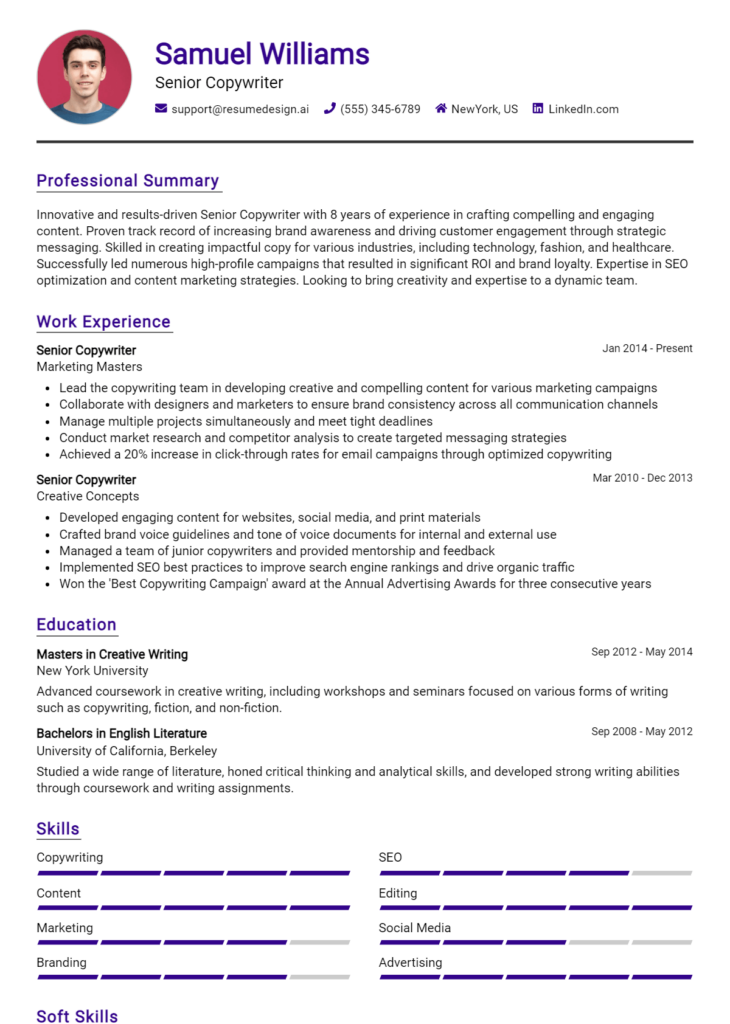Storyteller Core Responsibilities
A Storyteller plays a pivotal role in weaving narratives that connect various departments within an organization, enhancing collaboration and communication. Key responsibilities include crafting compelling stories that align with business objectives, conducting research to inform narratives, and collaborating with marketing, sales, and product teams to ensure messaging consistency. Essential skills encompass technical proficiency in storytelling mediums, operational awareness to manage projects, and strong problem-solving abilities to address challenges creatively. A well-structured resume can effectively showcase these qualifications, demonstrating how a Storyteller contributes to achieving the organization’s overarching goals.
Common Responsibilities Listed on Storyteller Resume
- Developing engaging narratives for various platforms and audiences
- Collaborating with cross-functional teams to align storytelling initiatives
- Conducting research to enhance narrative authenticity and relevance
- Creating content strategies that support organizational goals
- Utilizing multimedia tools to enhance storytelling effectiveness
- Analyzing audience feedback and engagement metrics to refine stories
- Managing timelines and project milestones for storytelling initiatives
- Presenting stories to stakeholders and gathering input for improvement
- Staying updated on industry trends to inform storytelling techniques
- Training team members on effective storytelling practices
- Ensuring brand consistency across all storytelling efforts
- Building relationships with external partners to enrich storytelling content
High-Level Resume Tips for Storyteller Professionals
In the world of storytelling, your resume serves as your narrative’s opening lines, setting the tone for the professional journey you want to embark on. For Storyteller professionals, a well-crafted resume is not just a list of jobs; it’s a powerful narrative that encapsulates your skills, experiences, and achievements. It’s often the first impression you make on potential employers, and it needs to resonate with the creativity and passion that define your work. This guide will provide practical and actionable resume tips specifically tailored for Storyteller professionals, ensuring that your resume effectively conveys your unique story and captivates your audience—hiring managers.
Top Resume Tips for Storyteller Professionals
- Tailor your resume to each job description, highlighting relevant experiences and skills that align with the specific storytelling role.
- Showcase your storytelling experience in various formats, such as scripts, articles, or presentations, to demonstrate versatility.
- Quantify your achievements by including metrics, such as audience size, engagement rates, or project outcomes, to illustrate the impact of your work.
- Highlight industry-specific skills, like creative writing, character development, and narrative structure, to showcase your expertise.
- Include a portfolio link to your best storytelling samples, making it easy for employers to see your work firsthand.
- Utilize action verbs and vivid language to bring your resume to life, creating a compelling narrative about your career.
- Keep the design clean and visually appealing, ensuring that your resume is easy to read and reflects your creative personality.
- Incorporate keywords from the job posting to improve your chances of passing through applicant tracking systems.
- Consider adding a summary or objective statement that succinctly captures your storytelling philosophy and career goals.
By implementing these tips, you can significantly enhance your resume, making it a powerful tool that increases your chances of landing a job in the Storyteller field. A well-structured resume not only highlights your unique skills and experiences but also tells a story of your professional journey, helping you stand out in a competitive job market.
Why Resume Headlines & Titles are Important for Storyteller
In the competitive landscape of storytelling roles, a well-crafted resume headline or title serves as a critical first impression. It acts as a beacon, immediately capturing the attention of hiring managers and succinctly summarizing the candidate's most relevant qualifications in a single impactful phrase. A strong headline can differentiate a storyteller from countless applicants, making it essential that it is concise, relevant, and directly related to the position being applied for. By effectively articulating one's unique narrative flair or experience, a compelling resume headline sets the stage for the rest of the resume, inviting deeper exploration into the candidate's storytelling abilities.
Best Practices for Crafting Resume Headlines for Storyteller
- Be concise: Aim for a headline that is no longer than 10-12 words.
- Be specific: Tailor your headline to reflect the particular storytelling role you’re applying for.
- Highlight key skills: Incorporate essential skills or experiences that are relevant to the job.
- Use powerful language: Choose impactful words that convey confidence and expertise.
- Avoid jargon: Ensure that the language is accessible and relatable to a broad audience.
- Showcase results: If applicable, hint at measurable achievements in your headline.
- Align with job description: Mirror the language and keywords from the job posting.
- Reflect your unique voice: Let your personal storytelling style shine through in your headline.
Example Resume Headlines for Storyteller
Strong Resume Headlines
Creative Storyteller Specializing in Engaging Multimedia Narratives
Award-Winning Writer with a Passion for Digital Storytelling
Experienced Narrative Designer with a Focus on Interactive Experiences
Skilled Content Creator Driven by Compelling Storytelling Techniques
Weak Resume Headlines
Just Another Storyteller
Writer with Experience
Looking for Opportunities in Storytelling
The strong headlines are effective because they convey a clear message about the candidate's expertise and unique strengths, making them memorable and relevant to the hiring manager. They showcase specific skills and achievements that align with the job, inviting further interest. Conversely, the weak headlines fail to impress due to their vagueness and lack of specificity, leaving hiring managers with no compelling reason to delve deeper into the resume. By avoiding generic language and instead focusing on targeted, impactful phrases, candidates can significantly enhance their chances of standing out in a crowded field.
Writing an Exceptional Storyteller Resume Summary
A well-crafted resume summary is essential for a Storyteller, as it serves as the first impression a hiring manager will have of a candidate's qualifications and creativity. A strong summary can quickly capture attention by presenting key skills, relevant experiences, and notable accomplishments concisely and engagingly. It acts as a hook, drawing the reader into the deeper narrative of the applicant's professional journey. To be effective, the summary should be concise, impactful, and specifically tailored to the job being applied for, ensuring that it resonates with the employer's needs and expectations.
Best Practices for Writing a Storyteller Resume Summary
- Quantify achievements to provide measurable impact, such as audience size or engagement rates.
- Highlight specific storytelling skills, including creative writing, narrative development, and audience engagement.
- Tailor the summary to the job description, using keywords and phrases that align with the employer's requirements.
- Keep it concise, ideally within 3-5 sentences, to maintain the reader’s interest.
- Showcase relevant experience, particularly projects or roles that directly relate to storytelling.
- Incorporate strong action verbs to convey confidence and authority in your skills.
- Focus on unique qualities or perspectives that differentiate you from other candidates.
- Maintain a tone that reflects your storytelling style, whether it be professional, imaginative, or conversational.
Example Storyteller Resume Summaries
Strong Resume Summaries
Creative storyteller with over 8 years of experience crafting compelling narratives for diverse audiences. Successfully increased reader engagement by 40% through innovative digital storytelling techniques and interactive content development.
Award-winning writer with a passion for narrative development, having produced over 50 short stories and articles featured in various literary magazines. Recognized for ability to evoke emotion and connect with readers on a personal level, resulting in a loyal following of over 10,000 readers.
Dynamic storyteller and content creator skilled in multimedia storytelling, including video and podcast production. Led a project that garnered over 1 million views, demonstrating a keen understanding of audience preferences and effective content delivery.
Weak Resume Summaries
I am a storyteller with some experience in writing and creating content. I enjoy telling stories and hope to find a job that allows me to do that.
Passionate about storytelling and have written a few pieces. Looking for opportunities in writing and storytelling.
The examples listed above highlight the distinction between strong and weak resume summaries. Strong summaries effectively quantify achievements and showcase specific skills relevant to storytelling, making them compelling and memorable. In contrast, weak summaries lack specificity, measurable outcomes, and fail to convey the candidate's unique value, rendering them generic and less impactful.
Work Experience Section for Storyteller Resume
The work experience section of a Storyteller's resume is crucial as it effectively illustrates the candidate's journey through the art of storytelling, showcasing their technical skills and leadership capabilities. This section highlights the ability to manage teams, cultivate creative ideas, and deliver high-quality narratives that resonate with audiences. By quantifying achievements and aligning experiences with industry standards, candidates can demonstrate their value and impact in the storytelling domain, making a compelling case to potential employers.
Best Practices for Storyteller Work Experience
- Focus on specific storytelling platforms and mediums where you have demonstrated expertise.
- Quantify results by including metrics such as audience reach, engagement rates, or project timelines.
- Highlight leadership roles and team collaborations that contributed to successful storytelling projects.
- Use action verbs to describe your contributions and the outcomes of your work.
- Align your experience with industry standards by referencing recognized storytelling techniques and frameworks.
- Include relevant software or tools you are proficient in that enhance your storytelling capabilities.
- Tailor your experiences to the job description, ensuring your skills align with employer expectations.
- Showcase any awards or recognitions received for your storytelling efforts to enhance credibility.
Example Work Experiences for Storyteller
Strong Experiences
- Led a cross-functional team of 10 in the development of a multi-platform storytelling campaign that increased audience engagement by 30% over six months.
- Produced a short film that won the Best Narrative Award at the XYZ Film Festival, attracting over 100,000 views on social media.
- Implemented innovative storytelling techniques using augmented reality, resulting in a 25% boost in user interaction on the company app.
- Collaborated with a diverse group of artists and writers to create a graphic novel that sold 5,000 copies within the first month of launch.
Weak Experiences
- Worked on various storytelling projects with some success.
- Participated in team meetings to discuss ideas about storytelling.
- Helped with content creation for social media without clear results.
- Contributed to a project that was about storytelling, but details are unclear.
The strong experiences listed are compelling because they include quantifiable outcomes, demonstrate technical leadership, and highlight collaboration in impactful projects. In contrast, the weak experiences lack specificity, measurable achievements, and fail to convey the candidate's role in contributing to storytelling efforts, making them less impressive to potential employers. Strong experiences paint a vivid picture of the storyteller's capabilities, while weak experiences leave much to be desired in terms of clarity and impact.
Education and Certifications Section for Storyteller Resume
The education and certifications section of a Storyteller resume plays a crucial role in showcasing a candidate's academic foundation and their commitment to professional growth. This section not only highlights relevant degrees, but also emphasizes industry-recognized certifications and any specialized training that can bolster the storyteller's skill set. By providing details about relevant coursework, certifications, and ongoing education efforts, candidates can significantly enhance their credibility and demonstrate their alignment with the demands of the storytelling role. This information reassures potential employers of the candidate's dedication to mastering their craft and staying current in a dynamic industry.
Best Practices for Storyteller Education and Certifications
- Include only relevant degrees and certifications that directly apply to storytelling and related fields.
- Detail any specialized training or workshops that enhance storytelling techniques or methodologies.
- List coursework that pertains to narrative development, creative writing, or communication.
- Highlight advanced degrees (e.g., Master’s in Creative Writing) or recognized certifications (e.g., Certified Storytelling Professional).
- Ensure that the education and certifications section is well-organized and easy to read.
- Update this section regularly to reflect new learning experiences and credentials.
- Consider including online courses or credentials from reputable platforms, especially if they are industry-specific.
- Use bullet points to clearly present each qualification, making it easier for hiring managers to scan the information.
Example Education and Certifications for Storyteller
Strong Examples
- M.A. in Creative Writing, University of Fictional Arts, 2021
- Certified Storytelling Professional (CSP), International Storytelling Association, 2022
- Workshop: Advanced Narrative Techniques, Storytelling Academy, 2023
- Coursework in Digital Storytelling and Multimedia Narration, Online University, 2020
Weak Examples
- Bachelor of Science in Biology, State University, 2015
- Certification in Basic Computer Skills, Community College, 2018
- High School Diploma, Local High School, 2010
- Workshop: General Public Speaking, Unknown Provider, 2019
The strong examples listed above are considered relevant because they directly relate to storytelling and demonstrate advanced skills in narrative development. They reflect a commitment to the craft and an understanding of the industry. Conversely, the weak examples are deemed irrelevant or outdated, as they do not pertain to storytelling qualifications and do not enhance the candidate's profile in the eyes of potential employers.
Top Skills & Keywords for Storyteller Resume
Crafting a compelling resume as a storyteller requires a careful balance of showcasing both hard and soft skills. These skills not only highlight your technical abilities and knowledge but also your capacity to connect with audiences on an emotional level. A well-rounded storyteller draws upon a diverse skill set to engage, entertain, and inspire. When potential employers review your resume, they will look for these skills to determine your ability to convey narratives effectively. Including relevant skills in your resume can significantly enhance your chances of landing a storytelling position, making it crucial to select and present them wisely. For more insights on how to enhance your resume, consider checking out our resources on skills and work experience.
Top Hard & Soft Skills for Storyteller
Soft Skills
- Creativity
- Emotional Intelligence
- Empathy
- Communication
- Adaptability
- Active Listening
- Collaboration
- Time Management
- Critical Thinking
- Persuasion
Hard Skills
- Narrative Structure
- Scriptwriting
- Editing and Proofreading
- Digital Storytelling
- Research Skills
- Audience Analysis
- Voice Modulation
- Visual Storytelling Techniques
- Social Media Proficiency
- Proficiency in Storytelling Software (e.g., Adobe Creative Suite, Final Cut Pro)
Stand Out with a Winning Storyteller Cover Letter
Dear [Hiring Manager's Name],
I am writing to express my enthusiasm for the Storyteller position at [Company Name], as advertised on [where you found the job listing]. With a rich background in narrative crafting and a passion for engaging audiences, I am excited about the opportunity to bring innovative storytelling techniques to your team. My experience spans various mediums, from traditional print to digital platforms, and I thrive on the challenge of creating compelling narratives that resonate with diverse audiences.
In my previous role at [Previous Company Name], I successfully developed and executed a series of storytelling campaigns that increased audience engagement by over 30%. By utilizing data-driven insights and understanding audience preferences, I was able to craft narratives that not only captured attention but also fostered a deeper connection with the brand. My collaborative approach allowed me to work closely with cross-functional teams, ensuring that each story aligned with overarching marketing strategies and brand values.
What excites me most about the Storyteller position at [Company Name] is the opportunity to push creative boundaries and explore new storytelling formats. I am particularly drawn to [specific project or initiative from the company], and I believe my skills in adapting narratives across different mediums—whether through written content, video, or social media—would contribute significantly to your team. I am eager to bring my unique perspective and innovative ideas to help elevate [Company Name]'s storytelling efforts.
Thank you for considering my application. I look forward to the possibility of discussing how my experience and passion for storytelling can contribute to the amazing work being done at [Company Name]. Please feel free to contact me at [your phone number] or [your email address] to schedule a conversation.
Warm regards,
[Your Name]
[Your LinkedIn Profile or Portfolio URL]
[Your Phone Number]
[Your Email Address]
Common Mistakes to Avoid in a Storyteller Resume
Crafting a resume as a storyteller requires a unique blend of creativity and professionalism. While showcasing your narrative skills is essential, there are common pitfalls that can undermine your application. Avoiding these mistakes can significantly enhance your chances of capturing the attention of hiring managers and securing storytelling opportunities.
Neglecting a Strong Opening Statement: Failing to include a compelling summary or objective can leave your resume feeling flat. A strong opening sets the tone and highlights your storytelling abilities right from the start.
Overloading with Jargon: While industry-specific language can demonstrate expertise, excessive jargon can alienate readers. Ensure your language remains accessible and engaging.
Ignoring Structure and Format: A cluttered or poorly formatted resume can detract from your storytelling prowess. A clean, organized layout with clear sections helps guide the reader through your story.
Focusing on Responsibilities Instead of Achievements: Listing duties without showcasing accomplishments can make your experience seem less impactful. Highlight specific successes and the skills you used to achieve them.
Failing to Tailor Content for Each Application: Sending out a generic resume can suggest a lack of genuine interest in the position. Customize your resume for each role, aligning your skills and experiences with the job description.
Neglecting to Include Relevant Experience: Omitting freelance work, volunteer projects, or informal storytelling experiences can limit your narrative. Include diverse experiences that showcase your breadth of storytelling abilities.
Using Passive Voice: Passive voice can make your accomplishments feel less dynamic. Use active voice to create a sense of action and engagement in your resume.
Forgetting to Showcase Soft Skills: Storytelling is not just about the narratives themselves; it's also about conveying emotion and connection. Highlighting soft skills such as empathy, communication, and collaboration can provide a fuller picture of your capabilities.
Conclusion
In today’s competitive job market, a well-crafted resume is essential for any storyteller looking to make their mark. Throughout this article, we’ve explored the vital components that make a compelling storyteller resume, including the importance of showcasing your narrative skills, highlighting relevant experiences, and demonstrating your ability to engage and captivate an audience.
We discussed how to effectively present your storytelling techniques, whether through written formats, oral presentations, or digital media. Each storytelling role may require a unique approach, so tailoring your resume to reflect the specific requirements of the job you're applying for is crucial. Remember to include quantifiable achievements and specific examples that illustrate your impact as a storyteller.
As you prepare to take the next step in your storytelling career, we encourage you to review your resume critically. Are you effectively communicating your skills and experiences? Do you have a clear structure that makes it easy for hiring managers to see your qualifications?
To help you in this process, consider utilizing the various resources available to enhance your resume. Check out our resume templates for professionally designed layouts that can make your resume stand out. Use our resume builder to create a polished document easily. You can also browse through our resume examples for inspiration on how to effectively convey your unique storytelling journey. Finally, don’t forget the importance of a powerful introduction; explore our cover letter templates to craft a compelling narrative that complements your resume.
Take action today—refine your storyteller resume and equip yourself with the tools necessary to captivate potential employers!

